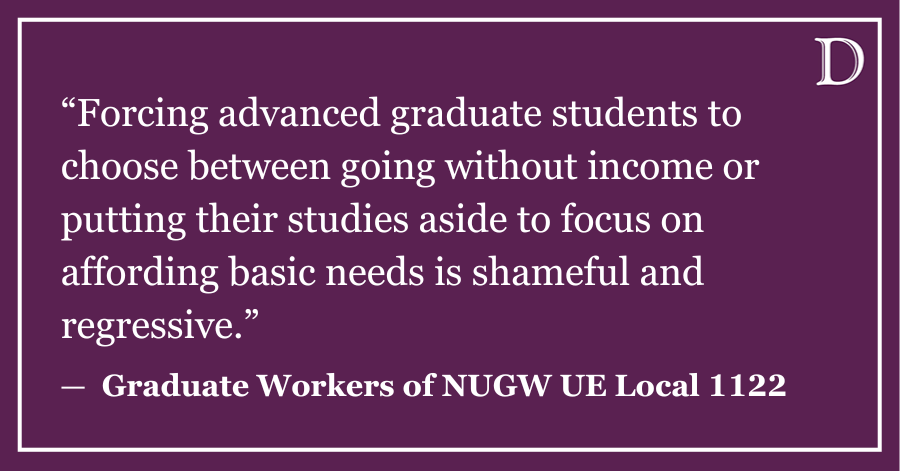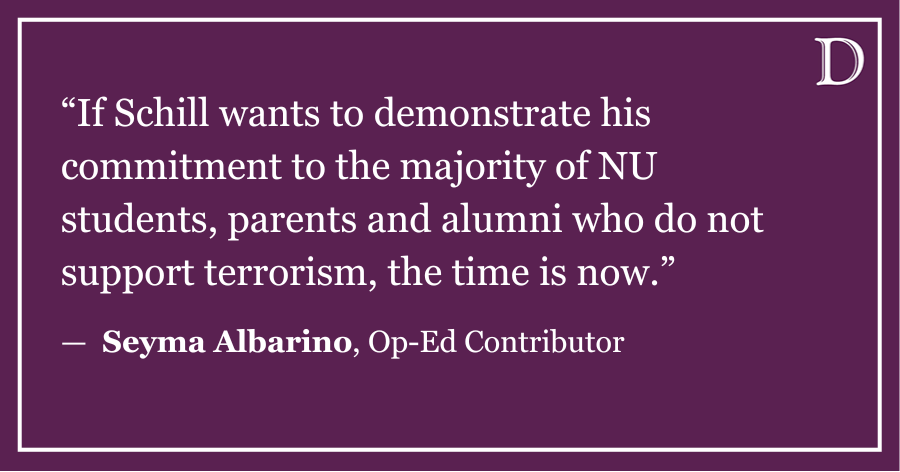In times of crises, media professionals and public figures, including heads of state and celebrities, privilege emotions over interrogating reported accounts and the verification of facts. This has escalated with the hegemonic rise of new media and artificial intelligence.
During such times, it behooves universities and academics, including our own university, faculty and students, to maintain a nuanced approach that shoulders professional and ethical responsibilities to avoid the perpetuation of unverified accounts. We must not lose rigor, balanced judgement, critical thinking and moral clarity. The ethos we teach in our classrooms requires us to challenge narratives, even those that have become dominant by the resources of powerful governments and corporate media.
Unfortunately, Northwestern’s administration has not adhered to these fundamental standards. While we are witnessing a bloody, asymmetrical war being waged on over two million Palestinians in the Gaza Strip, NU issued a statement on Oct. 17 condemning my comments, an 11-year faculty member of the University, because I attempted to challenge one dominant narrative surrounding this inhumane war.
As an author of two books on Hamas, I was interviewed by the WBUR On Point program, which aired on Oct. 16 under the title “Hamas: A History Lesson.” In the interview, I questioned the credibility of media reporting around figures of civilian casualties from Hamas’s Oct. 7 attack, as reported by Israeli officials and largely uncorroborated by independent news sources.
I tried to explain that Israel, in the context of its demonization campaign against Hamas and Palestinians, has purposely aimed to shape global public opinion for its subsequent war against Palestinians — which many experts describe as an unfolding genocide. Israel has disseminated numerous stories in the media that have been proven to be unverified and propaganda, such as stories of the beheadings of 40 babies and women being raped that dominated the headlines.
Let me be clear: I did not deny that the killings of civilians took place, nor did I minimize or misrepresent the acts.
On the same day that the interview aired, without prior explanation to me, the network posted a disclaimer on its website, stating that the episode did not meet its “editorial standards” and citing that “Professor Hroub expressed doubt that women and children had been killed by Hamas in its Oct. 7 attack on Israel.”
Instead of corroborating the truth, the University administration issued a statement of condemnation without making any effort to contact me and hear my views and intentionality. The following day, Oct. 18, The Daily published a short piece under the title “Northwestern condemns Prof. Khaled AL-Hroub’s comments on Hamas.” NU’s statement was later slightly mitigated, and The Daily reported that.
By publishing this story in an equally hasty fashion, The Daily failed the very basics of journalistic practice that require inclusion of my side of the story. The damage inflicted on me, my reputation, my scholarship and even my family by my own university and by irresponsible coverage from this outlet is devastating. I have received emails filled with hate speech, Islamophobic slurs and death threats.
At NU’s campus in Qatar, I take pride in teaching a course titled “Media and Politics in the Arab World.” In it, I teach the necessities of dissecting the official media discourse of governments and political parties, both in times of peace and in times of war. We examine themes such as misinformation, propaganda and false discourse manufactured through manipulation by governments and their media.
Within this context and in extreme times of war, I teach my students how manipulation, defaming, distorting and the dehumanization by portraying an enemy as “subhumans” or “human animals” paves the way for accepting military or even genocidal actions that do not adhere to any ethical and legal standards.
The lead example that I always present to my students is the extensive anti-Jewish Nazi propaganda that lasted for years before the Holocaust, aiming to prepare the public to accept the coming atrocity by portraying Jews as animals and less than humans.
From this perspective and in the context of professional and ethical considerations, I questioned the reporting disseminated by the Israeli military during the live interview. This is what I shared with other media outlets when they contacted me for comment.
My logical conclusion was as follows: since Israel, a warring entity, is the sole source of information, it is our right to demand that its information be substantiated, especially given very recent precedents of false stories being disseminated.
I did not deny the killing of Israeli civilians by Hamas. On the contrary, I stated in the interview that Hamas had indeed killed civilians, even prior to this war. My emphasis was on the importance of verifying every piece of media information and not succumbing to propaganda discourse that often prevails during times of war.
It is truly shameful that my university, which I take pride in, rushed to issue a condemnation against me and accused me of misrepresenting facts without even reaching out to me to hear my perspective. I have always assumed and continue to assume that we are an academic institution that upholds the values of intellectual freedom, rational thinking and critical analysis.
I would, thus, hope that the University completely retracts its statement and apologizes to me for the harm done to me and my family by their hasty and defamatory statement.
Finally, and beyond what I have faced personally, the pressing moral and human responsibility we all have to shoulder is to campaign for the immediate end to an ongoing, colossal, genocidal war that is taking place against the Palestinians in the Gaza Strip. This should be the leading concern and unwavering principled obligation for all values-led institutions and individuals, including our university and its student media.
If you would like to respond publicly to this op-ed, send a Letter to the Editor to [email protected]. The views expressed in this piece do not necessarily reflect the views of all staff members of The Daily Northwestern.
AL-Hroub: Academics have the right to question Israel’s war misinformation campaign
Khaled AL-Hroub, Op-Ed Contributor
October 27, 2023
More to Discover















